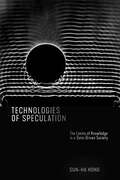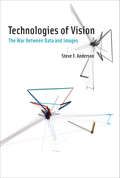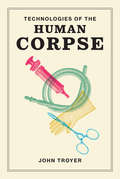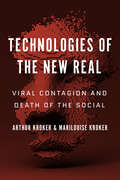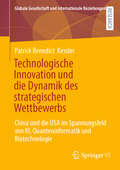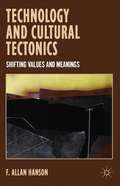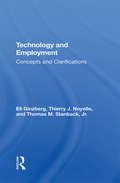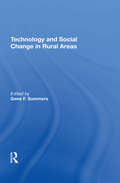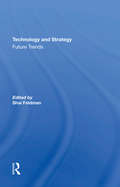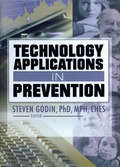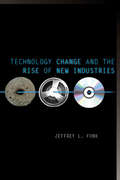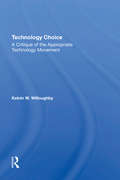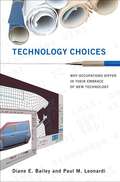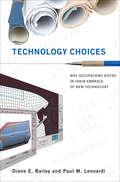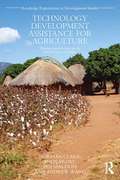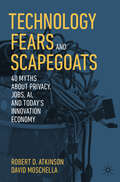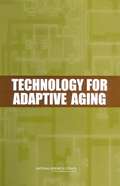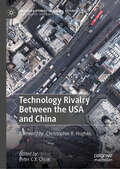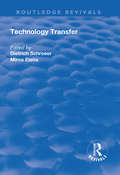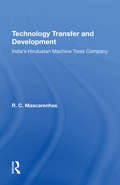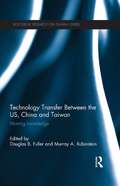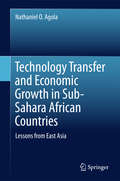- Table View
- List View
Technologies of Speculation: The Limits of Knowledge in a Data-Driven Society
by Sun-ha HongAn inquiry into what we can know in an age of surveillance and algorithms Knitting together contemporary technologies of datafication to reveal a broader, underlying shift in what counts as knowledge, Technologies of Speculation reframes today’s major moral and political controversies around algorithms and artificial intelligence. How many times we toss and turn in our sleep, our voluminous social media activity and location data, our average resting heart rate and body temperature: new technologies of state and self-surveillance promise to re-enlighten the black boxes of our bodies and minds. But Sun-ha Hong suggests that the burden to know and to digest this information at alarming rates is stripping away the liberal subject that ‘knows for themselves’, and risks undermining the pursuit of a rational public. What we choose to track, and what kind of data is extracted from us, shapes a society in which my own experience and sensation is increasingly overruled by data-driven systems. From the rapidly growing Quantified Self community to large-scale dragnet data collection in the name of counter-terrorism and drone warfare, Hong argues that data’s promise of objective truth results in new cultures of speculation. In his analysis of the Snowden affair, Hong demonstrates an entirely new way of thinking through what we could know, and the political and philosophical stakes of the belief that data equates to knowledge. When we simply cannot process all the data at our fingertips, he argues, we look past the inconvenient and the complicated to favor the comprehensible. In the process, racial stereotypes and other longstanding prejudices re-enter our newest technologies by the back door. Hong reveals the moral and philosophical equations embedded into the algorithmic eye that now follows us all.
Technologies of Vision: The War Between Data and Images (The\mit Press Ser.)
by Steve F AndersonAn investigation of the computational turn in visual culture, centered on the entangled politics and pleasures of data and images.If the twentieth century was tyrannized by images, then the twenty-first is ruled by data. In Technologies of Vision, Steve Anderson argues that visual culture and the methods developed to study it have much to teach us about today's digital culture; but first we must examine the historically entangled relationship between data and images. Anderson starts from the supposition that there is no great divide separating pre- and post-digital culture. Rather than creating an insular field of new and inaccessible discourse, he argues, it is more productive to imagine that studying “the digital” is coextensive with critical models—especially the politics of seeing and knowing—developed for understanding “the visual.”Anderson's investigation takes on an eclectic array of examples ranging from virtual reality, culture analytics, and software art to technologies for computer vision, face recognition, and photogrammetry. Mixing media archaeology with software studies, Anderson mines the history of technology for insight into both the politics of data and the pleasures of algorithms. He proposes a taxonomy of modes that describe the functional relationship between data and images in the domains of space, surveillance and data visualization. At stake in all three are tensions between the totalizing logic of data and the unruly chaos of images.
Technologies of the Gendered Body: Reading Cyborg Women
by Anne BalsamoThis book takes the process of "reading the body" into the fields at the forefront of culture--the vast spaces mapped by science and technology--to show that the body in high-tech is as gendered as ever. From female body building to virtual reality, from cosmetic surgery to cyberpunk, from reproductive medicine to public health policies to TV science programs, Anne Balsamo articulates the key issues concerning the status of the body for feminist cultural studies in a postmodern world. Technologies of the Gendered Body combines close readings of popular texts--such as Margaret Atwood's novel The Handmaid's Tale, the movie Pumping Iron II: The Women, cyberpunk magazines, and mass media--with analyses of medical literature, public policy documents, and specific technological practices. Balsamo describes the ways in which certain biotechnologies are ideologically shaped by gender considerations and other beliefs about race, physical abilities, and economic and legal status. She presents a view of the conceptual system that structures individuals access to and participation in these technologies, as well as an overview of individuals rights and responsibilities in this sometimes baffling area. Examining the ways in which the body is gendered in its interactions with new technologies of corporeality, Technologies of the Gendered Body counters the claim that in our scientific culture the material body has become obsolete. With ample evidence that the techno-body is always gendered and marked by race, this book sets the stage for a renewed feminist engagement with contemporary technological narratives.
Technologies of the Human Corpse (The\mit Press Ser.)
by John TroyerThe relationship of the dead body with technology through history, from nineteenth-century embalming machines to the death-prevention technologies of today.Death and the dead body have never been more alive in the public imagination—not least because of current debates over modern medical technology that is deployed, it seems, expressly to keep human bodies from dying, blurring the boundary between alive and dead. In this book, John Troyer examines the relationship of the dead body with technology, both material and conceptual: the physical machines, political concepts, and sovereign institutions that humans use to classify, organize, repurpose, and transform the human corpse. Doing so, he asks readers to think about death, dying, and dead bodies in radically different ways. Troyer explains, for example, how technologies of the nineteenth century including embalming and photography, created our image of a dead body as quasi-atemporal, existing outside biological limits formerly enforced by decomposition. He describes the “Happy Death Movement” of the 1970s; the politics of HIV/AIDS corpse and the productive potential of the dead body; the provocations of the Body Worlds exhibits and their use of preserved dead bodies; the black market in human body parts; and the transformation of historic technologies of the human corpse into “death prevention technologies.” The consequences of total control over death and the dead body, Troyer argues, are not liberation but the abandonment of Homo sapiens as a concept and a species. In this unique work, Troyer forces us to consider the increasing overlap between politics, dying, and the dead body in both general and specifically personal terms.
Technologies of the New Real: Viral Contagion and Death of the Social (Digital Futures)
by Arthur Kroker Marilouise KrokerWith astonishing speed, we have been projected into a new reality where interactions with drones, robotic bodies, and high-level surveillance are increasingly mainstream. In this age of groundbreaking developments in robotic technologies, synthetic biology is merging with artificial intelligence, forming a newly blended reality of machines, bodies, and affect. Technologies of the New Real draws from critical intersections of technology and society – including drones, surveillance, DIY bodies, and innovations in robotic technology – to explore what these advances can tell us about our present reality, or what authors Arthur and Marilouise Kroker deem the "new real" of digital culture in the twenty-first century. Technologies of the New Real explores the many technologies of our present reality as they infiltrate the social, political, and economic static of our everyday lives, seemingly eroding traditionally conceived boundaries between humans and machines, and rendering fully ambivalent borders between the human mind and simulated data.
Technologische Innovation und die Dynamik des strategischen Wettbewerbs: China und die USA im Spannungsfeld von KI, Quanteninformatik und Biotechnologie (Globale Gesellschaft und internationale Beziehungen)
by Patrick Benedict KesslerTechnologische Innovation ist ein fundamentaler Treiber gesellschaftlicher Entwicklung. Im strategischen Wettbewerb von Staaten ist technologische Innovation ebenfalls entscheidend, da der Staat, der sich einen Vorsprung bei neuen Schlüsseltechnologien sichern kann, die internationale Machtbalance zu seinen Gunsten verschieben und in der Zukunft prägen wird. Hier setzt die Analyse von Patrick Benedict Kessler an und fragt nach den Auswirkungen technologischer Innovation in den Bereichen Künstliche Intelligenz, Quanteninformatik und Biotechnologie auf den strategischen Wettbewerb zwischen der Volksrepublik China (VRC) und den Vereinigten Staaten von Amerika (USA). Im Rahmen eines X-zentriertes Forschungsdesigns werden die Nationalen Sicherheitsinnovationsbasen der beiden Staaten miteinander verglichen und im Anschluss wird eine theorietestende Prozessanalyse der Handlungen von VRC und USA in Verbindung mit KI, Quanteninformatik und Biotechnologie im Zeitraum von 2008 bis 2021 durchgeführt.
Technology And Cultural Tectonics
by F. Allan HansonWhat impact has technology had on cultural meanings, values, and symbols? This anthropological exploration shows how technologies produce novel and sometimes jarring realignments among cultural institutions.
Technology And Employment: Concepts And Clarifications
by Eli Ginzberg Thomas M Stanback Jr Thierry J NoyelleThis volume is the first of four publications that will present the research on technology and employment carried out by Conservation of Human Resources of Columbia University over the past several years. This research was started with a small grant from the Rockefeller Foundation in 1982.
Technology And Social Change In Rural Areas: A Festschrift For Eugene A. Wilkening
by Gene F SummersThe possibility of nuclear war, the failure of the Green Revolution, the capabilities of genetic engineering, and other actual and potential effects of technological innovations have created demands for a more humane application of technology. Addressing this issue, Technology and Social Change in Rural Areas is a clear assessment of the current state of affairs. The book begins with a discussion of the changing paradigms of technology adoption and diffusion, the dynamics of public resistance, and the question of social responsibility in an age of synthetic biology. In subsequent sections, the contributors assess the revolutionary effect of technology on agriculture worldwide and conclude that radically new public policies are essential; expose the transformations of rural life and communities that result from the localized effects of technology and its use as a weapon in world-system politics; and critically examine the appropriate technology movement. The essays are presented to honor Professor Eugene A. Wilkening for his many pioneering and lasting contributions to the study of technology and rural social change. The book includes an intellectual biography of Professor Wilkening written by his long-time colleague and friend, William H. Sewell.
Technology And Strategy: Future Trends
by Shai FeldmanThis monograph provides the highlights of an international conference held by the Jaffee Center for Strategic Studies on March 21-24, 1987, at Neve Ilan, Israel. It looks at the main trends of weapons development in NATO and at the directions of Soviet security thinking.
Technology Applications in Prevention
by Steven GodinControl health care costs with these cost-effective, technology-based prevention/intervention techniques!In 2001, Americans spent $1.4 trillion on health care services. By 2010, health care costs are forecasted to approach 20% of the United States&’ Gross National Product. Technology Applications in Prevention highlights much-needed technology-based prevention/intervention methods that can help contain health costs. "Efficient and Effective Uses of Technology in Community Research" provides the information that future prevention researchers and program evaluators will need to be effective in electronic data collection, management, and cost analysis. "Community Building with Technology: The Development of Collaborative Community Technology Initiatives" presents a case example showing how Web sites can function as regional clearinghouses of useful information and provide convenient forums where agency staff can update their prevention skills. "Applying Web-Based Survey Design Standards" addresses a question critical to professionals in e-data collection: How reliable is Web-based needs assessment and/or outcome data? This chapter suggests standards that should be adhered to in Internet-based data collection. "Assessing Quality Assurance of Self-Help Sites on the Internet" and "The Quality of Spanish Health Information Web Sites: An Emerging Disparity" address the current lack of quality in the health and mental health information available on the World Wide Web. "A Participatory Internet Initiative in an African-American Neighborhood" explores health disparity concerns regarding the use of the Internet. This chapter discusses several ways to empower those who are on the dark side of the "digital divide"-and shows how to ensure that Web-based material is culturally relevant and appropriate for those it is intended to help. "Alcohol Abuse Prevention Among High-Risk Youth" presents a case example of a life-skills based CD-ROM intervention designed to discourage kids from abusing alcohol. "Constructing Better Futures Via Video" looks at video-based futures planning, which combines self-modeling and "feedforward" to forecast a student&’s future capabilities. This technique helps teenagers find meaning in their current educational setting and prepare for adulthood. This chapter also explains how to train school-based personnel to encourage positive attitudes and support the life skills of their students via carefully planned and edited-yet inexpensive-video productions.Why is the information in this book so essential? In 2000, approximately 20% of U.S. employers changed their health insurance plans as a cost savings strategy. American companies and their employees must new deal with new insurance plans that have reduced the breadth of their coverage and/or increased employee deductibles. The need for cost-effective preventive strategies is becoming increasingly more urgent as employers and insurance companies scramble to provide affordable health care coverage. New technologies have opened the door to better, more economical modes of preventive care. This book presents a vital cross-section of the current state of the art in the application of technology to prevention and intervention. Make it a part of your professional/teaching collection today!
Technology Change and the Rise of New Industries
by Jeffrey L. FunkTechnology Change and the Rise of New Industries explores why new industries emerge at specific moments in time and in certain countries. Part I shows that technologies which experience "exponential" improvements in cost and performance have a greater chance of becoming new industries. When "low-end" discontinuities incur exponential improvements, they often displace the dominant technologies and become "disruptive" innovations. Part II explores this phenomenon and instances in which discontinuities spawn new industries because they impact higher-level systems. Part III addresses a different set of questions—ones that consider the challenges of new industries for firms and governments. Part IV uses ideas from the previous chapters to analyze the present and future of selected technologies. Based on analyses of many industries, including those with an electronic and clean energy focus, this book challenges the conventional wisdom that performance dramatically rises following the emergence of a new technology, that costs fall due to increases in cumulative production, and that low-end innovations automatically become disruptive ones.
Technology Choice: A Critique Of The Appropriate Technology Movement
by Kelvin W WilloughbyThis book attempts to provide a theoretical framework for answering difficult questions evoked by the concept of technology choice primarily by conducting a review of the Appropriate Technology movement and its ideas and experiments.
Technology Choices
by Diane E. Bailey Paul M. LeonardiWhy do people who perform largely the same type of work make different technology choices in the workplace? An automotive design engineer working in India, for example, finds advanced information and communication technologies essential, allowing him to work with far-flung colleagues; a structural engineer in California relies more on paper-based technologies for her everyday work; and a software engineer in Silicon Valley operates on multiple digital levels simultaneously all day, continuing after hours on a company-supplied home computer and network connection. In Technology Choices, Diane Bailey and Paul Leonardi argue that occupational factors -- rather than personal preference or purely technological concerns -- strongly shape workers' technology choices. Drawing on extensive field work -- a decade's worth of observations and interviews in seven engineering firms in eight countries -- Bailey and Leonardi challenge the traditional views of technology choices: technological determinism and social constructivism. Their innovative occupational perspective allows them to explore how external forces shape ideas, beliefs, and norms in ways that steer individuals to particular technology choices -- albeit in somewhat predictable and generalizable ways. They examine three relationships at the heart of technology choices: human to technology, technology to technology, and human to human. An occupational perspective, they argue, helps us not only to understand past technology choices, but also to predict future ones.
Technology Choices: Why Occupations Differ in Their Embrace of New Technology (Acting with Technology)
by Diane E. Bailey Paul M. LeonardiAn analysis of the occupational factors that shape the technology choices made by people who perform the same type of work. Why do people who perform largely the same type of work make different technology choices in the workplace? An automotive design engineer working in India, for example, finds advanced information and communication technologies essential, allowing him to work with far-flung colleagues; a structural engineer in California relies more on paper-based technologies for her everyday work; and a software engineer in Silicon Valley operates on multiple digital levels simultaneously all day, continuing after hours on a company-supplied home computer and network connection. In Technology Choices, Diane Bailey and Paul Leonardi argue that occupational factors—rather than personal preference or purely technological concerns—strongly shape workers' technology choices. Drawing on extensive field work—a decade's worth of observations and interviews in seven engineering firms in eight countries—Bailey and Leonardi challenge the traditional views of technology choices: technological determinism and social constructivism. Their innovative occupational perspective allows them to explore how external forces shape ideas, beliefs, and norms in ways that steer individuals to particular technology choices—albeit in somewhat predictable and generalizable ways. They examine three relationships at the heart of technology choices: human to technology, technology to technology, and human to human. An occupational perspective, they argue, helps us not only to understand past technology choices, but also to predict future ones.
Technology Development Assistance for Agriculture: Putting research into use in low income countries (Routledge Explorations in Development Studies)
by Andrew Ward Norman Clark Andy Frost Ian MaudlinStemming from an 11-year DFID funded programme under its Renewable Natural Resources Research Strategy (RNRRS), Technology Development Assistance for Agriculture: Putting Research into Low Income Countries reviews part of this programme as a case study of a broader issue of technology development for Africa. Controversially, it critiques current international technology development assistance and focuses on the potential role of the private sector in agricultural technology development as well as providing insights for future cognate science policy and practice. The book focuses on the RIU "Best Bets" Africa sub-programme. This identified promising proposals to take existing agriculture research products and put these into use in ways that would benefit the poor in developing countries. The sum set aside for this was £5 million. The empirical sections of the book cover project selection, progress and programme management over a 2009-2012 period with special attention paid to lessons learned that may have implications for future cognate technology development assistance. This topical book gives direct evidence of meeting objectives and delivering real changes in technology development for Africa to postgraduate students, researchers, international bodies, NGOs, policy makers and government organisations working on natural resource management, technology development assistance, and low income country agriculture.
Technology Fears and Scapegoats: 40 Myths About Privacy, Jobs, AI, and Today’s Innovation Economy
by Robert D. Atkinson David MoschellaTechnologies and tech companies are routinely accused of creating many societal problems. This book exposes these charges as mostly myths, falsehoods, and exaggerations. Technology Fears and Scapegoats debunks 40 widespread myths about Big Tech, Big Data, AI, privacy, trust, polarization, automation, and similar fears, while exposing the scapegoating behind these complaints. The result is a balanced and positive view of the societal impact of technology thus far. The book takes readers through the steps and mindset necessary to restore the West’s belief in technological progress. Each individual chapter provides a cogent and often controversial rebuttal to a common tech accusation. The resulting text will inspire conversations among tech insiders, policymakers, and the general public alike.
Technology For Adaptive Aging
by National Research Council of the National AcademiesEmerging and currently available technologies offer great promise for helping older adults, even those without serious disabilities, to live healthy, comfortable, and productive lives. What technologies offer the most potential benefit? What challenges must be overcome, what problems must be solved, for this promise to be fulfilled? How can federal agencies like the National Institute on Aging best use their resources to support the translation from laboratory findings to useful, marketable products and services? Technology for Adaptive Aging is the product of a workshop that brought together distinguished experts in aging research and in technology to discuss applications of technology to communication, education and learning, employment, health, living environments, and transportation for older adults. It includes all of the workshop papers and the report of the committee that organized the workshop. The committee report synthesizes and evaluates the points made in the workshop papers and recommends priorities for federal support of translational research in technology for older adults.
Technology Matters: Questions to Live With
by David E. NyeTechnology matters, writes David Nye, because it is inseparable from being human. We have used tools for more than 100,000 years, and their central purpose has not always been to provide necessities. People excel at using old tools to solve new problems and at inventing new tools for more elegant solutions to old tasks. Perhaps this is because we are intimate with devices and machines from an early age--as children, we play with technological toys: trucks, cars, stoves, telephones, model railroads, Playstations. Through these machines we imagine ourselves into a creative relationship with the world. As adults, we retain this technological playfulness with gadgets and appliances--Blackberries, cell phones, GPS navigation systems in our cars. We use technology to shape our world, yet we think little about the choices we are making. In "Technology Matters," Nye tackles ten central questions about our relationship to technology, integrating a half-century of ideas about technology into ten cogent and concise chapters, with wide-ranging historical examples from many societies. He asks: Can we define technology? Does technology shape us, or do we shape it? Is technology inevitable or unpredictable? (Why do experts often fail to get it right?) How do historians understand it? Are we using modern technology to create cultural uniformity, or diversity? To create abundance, or an ecological crisis? To destroy jobs or create new opportunities? Should "the market" choose our technologies? Do advanced technologies make us more secure, or escalate dangers? Does ubiquitous technology expand our mental horizons, or encapsulate us in artifice? These large questions may have no final answers yet, but weneed to wrestle with them--to live them, so that we may, as Rilke puts it, "live along some distant day into the answers."
Technology Rivalry Between the USA and China (Palgrave Studies in Global Security)
by Peter C.Y. ChowThis book addresses the geopolitics and geoeconomics of technological rivalry between the world’s two great powers: the USA and China. It focuses on the semiconductor industry, which, owing to its dual use in civilian and defence sectors, is critical to economic and national security interests. A diverse set of contributions from renowned scholars span wide-ranging topics to holistically analyze contemporary USA-China national security through a technological lens: the shifting trade and technology policy in the USA; the Chip-4 alliance as an industrial cartel; technology sanctions and the voice of high-tech industry in the USA; the race for digital sovereignty in the Gulf region and in Africa; Japan’s grand strategy vis-à-vis semiconductors; a critical assessment of China’s achievement on its self-sufficiency and effort in reducing its reliance on foreign supplies; the significance and the strategy of Taiwan’s semiconductor in the future, as well as how Taiwan can advance its national security through its status as a powerhouse of semiconductors; Korea’s semiconductor policy in response to international technology rivalry; India’s pursuit of semiconductors; and a close investigation of decoupling and hostility between the two great powers.
Technology Transfer (Isodarco Ser.)
by Dietrich Schroeer Mirco ElenaThis title was first published in 2000: The theme of this collection of essays is "technology transfer". The topic has three major aspects: the interchange of technologies between military and civilian applications - "spin-off", "dual use", "conversion" and "diversification" fall under this heading; the proliferation of military arms, which could occur either through arms races between developed nations or through the transfer of military technology from developed arms industries to less developed nations - "proliferation", "arms races" and "arms control agreements" fall under this heading; and the transfer of civilian technologies from developing nations to less developed nations. The expression, "North-South transfer" and the idea of "development" come under this final section. The essays offer examination of all three aspects.
Technology Transfer And Development: India's Hindustan Machine Tools Company
by R. C. Mascarenhas R C MascarenhasIn most Third World nations, importing technology from other countries is considered vital to industrialization and economic development. This book examines the processes of technology transfer and development by tracing how Hindustan Machine Tools—a public enterprise in India—successfully collaborated with manufacturers from industrialized nations in its growth from a single factory to a diversified industrial complex. The author critically analyzes the company's overall strategies for diversification and expansion and its approaches to selecting, acquiring, absorbing, and generating technology and to developing appropriate management. He also points to important relationships between “policy efficiency†and “administrative efficiency†and discusses socioeconomic and cultural factors that can obstruct the successful development and operation of an industrial enterprise in a developing country.
Technology Transfer Between the US, China and Taiwan: Moving Knowledge (Routledge Research on Taiwan Series)
by Douglas B. Fuller Murray A. RubinsteinExamining the flow of technical knowledge between the US, Taiwan and Mainland China over the last sixty-five years, this book shows that the technical knowledge that has moved between these states is vast and varied. It includes the invention and production of industrial goods, as well as knowledge of the patterns of corporate organization and management. Indeed, this diversity is reflected in the process itself, which is driven both by returning expatriates with knowledge acquired overseas and by successful government intervention in acquiring technology from multinational firms. Technology Transfer Between the US, China and Taiwan engages with the evolving debates on the merits, importance and feasibility of technology transfer in the process of economic development globally, and uses the example of Taiwan to show that multinational corporations can indeed play a positive role in economic development. Further, it reveals the underlying tension between international cooperation and nationalism which inevitably accompanies international exchanges, as well as the delicate balancing act required between knowledge acquisition and dangerous levels of dependency, and the beneficial role of the US in East Asia’s technological development. With contributors from disciplines ranging from history, geography, urban planning, sociology, political science and electrical engineering, this multi-disciplinary book will be of great interest to students and scholars working across a broad range of subjects including Taiwan studies, Chinese studies, economics, business studies and development studies.
Technology Transfer and Economic Growth in Sub-Sahara African Countries
by Nathaniel O. AgolaThis book provides a pragmatic analytical model grounded on the solid idea that technologies and the accompanying implementation efforts only make sense if they are successfully deployed in markets. The analytical model also provides an exhaustive analysis of all critical variables at the global, regional and national levels, which contribute to failure or success of technology transfer efforts. The model is validated by an incisive analysis of technology transfer experiences of Japan, Korea, Singapore, Taiwan (province of China), and Malaysia. While this book finds that these East Asian countries have had both diverging and converging models, and experiences with technology transfer, the enduring and fundamental aspects of technology transfer in specific industrial sectors and economic growth in these countries is then used to draw lessons for African countries. This book therefore is a timely and compelling piece of research work that provides valuable answers to the increasingly urgent question of how African countries can industrialize through technology transfer to meet their economic development and growth ideals.
Technology Transfer and Entrepreneurial Innovations: Policies Across Continents (International Studies in Entrepreneurship #51)
by David Urbano Maribel GuerreroEvidence suggests that economies with technology transfer initiatives provide a better supply of high-quality jobs and tend to be characterized by entrepreneurs with higher innovation contributions. This book explores the effectiveness of technology transfer policies and legislation on entrepreneurial innovation in a non-US context. It analyses the theoretical, empirical and managerial implications behind the success of technology transfer polices and legislations in stimulating entrepreneurial innovation; analyses which other contextual condition (e.g., culture) are necessary for successful implementation; and explores the extent and level of replication of US policies (e.g., Bayh-Dole Act, Small Business Innovation Research [SBIR] program) in other national and regional systems. In addition, this book looks at the effect technology transfer policies have on the adoption of open innovation and open science.
